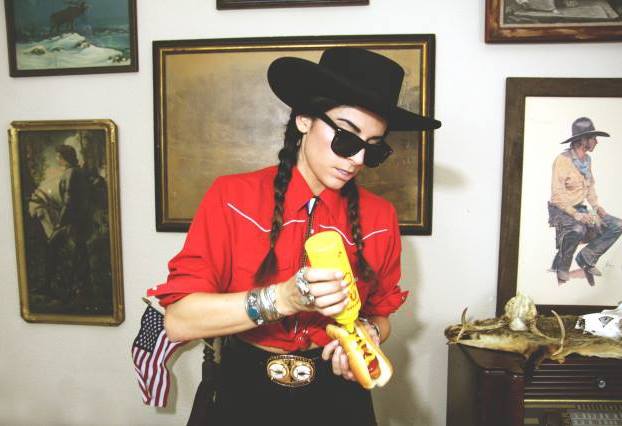Stasia Irons will never forget meeting Catherine Harris-White at an open mike in 2008. “I was just getting involved with spoken word poetry. But I was kind of clowning it at the same time,” she says. “Cat was doing this jazzy, soulful singing…. When I saw how free she was up there, just how confident, it definitely helped boost my confidence.”
At the time, Stas, who grew up in the church choir, was struggling with morale as a musician and lyricist. She was studying English Literature at the University of Washington; Cat was pursuing vocal jazz at Cornish College for the Arts. But that first meeting created a bond that friend Maikoiyo Alley-Barnes refers to in recent press materials as, “Past Lovers. Present Friends. Future Deities.”
“When we got together, being on stage, it was a whole other level,” says Stas about her eventual collaboration with Cat as THEESatisfaction, “nothing I had ever experienced before.”
The name THEESatisfaction is a study on the power of language.
“Back in the day, I had a Myspace and I would often change my name, just being unsatisfied with a lot of things,” says Stas. “I was like, ‘Why don’t I be The Satisfaction, since nothing else is satisfying?’”
Cat agreed and an extra ‘e’ was added, since it nodded to a shared love of Shakespeare, and, as Stas puts it, “us incorporating old school language and wanting to change the way we think about language.”
Stroll through the duo’s catalog and you’ll see this has been the case from the start: extra vowels and spontaneous capitol letters pepper songs like “Wee Sound Weird,” “QueenS,” and “deCODE,” and mark their two Sub Pop releases, 2012’s awE naturalE and their latest, dropping this week, EarthEE. The structures are playful but intentional, and getting it right matters. That kind of comprehension will help you melt into EarthEE, which has an astral-planing, mystical vibe like Erikah Badu grooving to Sun Ra on one of Saturn’s rings.
If this all sounds a little cosmic, well, it’s by a kind of loose design. The album cover art shows Stas and Cat nude, adorned in ritual regalia, seated on what looks like a geometric golden throne hovering in outer space (inside, pull out liner notes show a silhouette of the pair riding a dinosaur). These are themes that also signal their involvement with the artist collective known as Black Constellation, which counts other Seattle hip-hop and rap artists like OCnotes and visual artists like Barnes among its members, along with Ishmael Butler and Tendai Maraire of Shabazz Palaces, and producer Erik Blood; those latter three all appear on EarthEE.
As with the group’s first album, Blood again acted as co-producer and mixer, a role he clearly enjoys. “To be able to create with them is an honor and a joy at all times,” he said recently over the phone. His first impression meeting “the girls,” as they are affectionately known to friends, during Seattle Pride Weekend, is forever seared in his mind, too.
“I was walking back home through Cal Anderson Park and heard them playing through the air.” He was with friends and made everyone re-route in pursuit of the music. “‘We have to see what’s going on,’” he told them. “This sounds pretty amazing.”
It’s a fitting picture—encountering this music, carried on the breeze—that nicely describes the overall tone of THEESatisfaction, especially on the new album: a groove-oriented, soulful affair flecked with tantric rhythms and jazzy beats that flit and float about seemingly according to its own set of instincts.
From the onset, THEESat formed an entity as unified as it has been distinct on the scene. It’s almost impossible to find a photo online of either Stas or Cat pictured without the other. Interviews are only conducted with both members present. And, as organizers of the Black Weirdo party—what they call “a magical soulful, Black experience,” filled with music, DJs, drinks, and dancing—they bring together and celebrate the people of Seattle’s diverse and expressive black arts scene. The parties have since expanded to include the Black Weirdo communities of Brooklyn, Minneapolis, Oakland, and Toronto.
“We just wanted people to have a safe place to be. There wasn’t a lot of places for like queer people of color to feel comfortable just vibing out and dancing without being harassed or not feeling like they fit in,” Cat says.
As queer women of color, both nearing 30, there is an added charge of vitality within their work. With Cat, Stas, once a shaky performer, is now brimming with confidence; this is no more evident than in “Recognition,” EarthEE’s first single, as she calmly articulates the four syllables to the titled word, set to tribal, rhythmic mbira beats provided by Maraire. Backed by Stas, Cat has a bigger canvas to explore her jazzy vocals, which are smooth, rich, and drape like velvet over each spacey synth. It’s a union that’s undoubtedly benefited both.
“They’ve always had an extremely unique vision and their sound has always been very much them,” says Blood. “Even just talking about awE naturalE to EarthEE, they really have just accepted their own style and their own songwriting, and embraced it in a way that’s just breathtaking. There’s no one doing anything at all like what they do. It’s an unmistakable sound. Even just the structures of the songs—they’re so unique to them.”
Though as a collective, similarities do run through the work of Black Constellation artists. Blood was the force that introduced THEESat to Ishmael Butler, who invited Stas and Cat to guest on Shabazz Palaces’ 2011 Sub Pop album Black Up, which duly led the label to sign them, too. Butler has a warm, languid way of delivering his lyrics, and it’s apparent Stas has taken note. Elsewhere, anti-colonialism, nature worship, Black sovereignty, and celestial motifs wind their way through songs like “Planet for Sale” and “Prophetic Perfection” like a river forging a canyon.
In their own way, THEESat is forging a canyon, as the pair clearly owns their shit. Through their evolving work in Black Weirdo, and now, as new columnists for this paper (Ladies First runs the last Wednesday of every month), the two women have a heightened platform to discuss race, gender, and art in constructive ways, and they have seized it. In doing so, they’ve zeroed in on a long-delayed and positive zeitgeist: The world is actively listening to black people.
It’s not just black folks who come to Black Weirdo parties, for starters. “You just gotta be pro-people being themselves, pro-positivity,” says Stas. “It’s a freedom party. We play a bunch of weird stuff, music that makes you move and dance. We educate people. We have performers a lot. We really try to essentially open people into our home. It’s a loving place “
It’s also that what Stas and Cat are saying and singing is true—vague and cryptic it can be. At times, it’s universal, like the white appropriation of rap (Ladies First, December 31); at others, it’s their own personal truth, and a look into a reality Seattle finally seems poised to accept.
“Living in Seattle as a Black woman is interesting,” Cat says. “I blend in and stand out in various ways. Sometimes folks know I’m in THEESat [and] other times they confuse me with another Black person with an afro.” That happens more often than any of us here in the perfect, peaceable, bubble kingdom of Seattle might care to admit, she says.
“I have always found a way to express myself freely, but it hasn’t been easy. Seattle is a very liberal and conservative city. It’s okay to be queer but more acceptable if you are a certain kind of queer person. Which leads to boxes and labeling and of course outsiders. I’m definitely supported by the Seattle community but it took a while for folks to be comfortable with us and our art form.”
[At 1300 words, trying for 200 more. Waiting on a few more quotes!]







